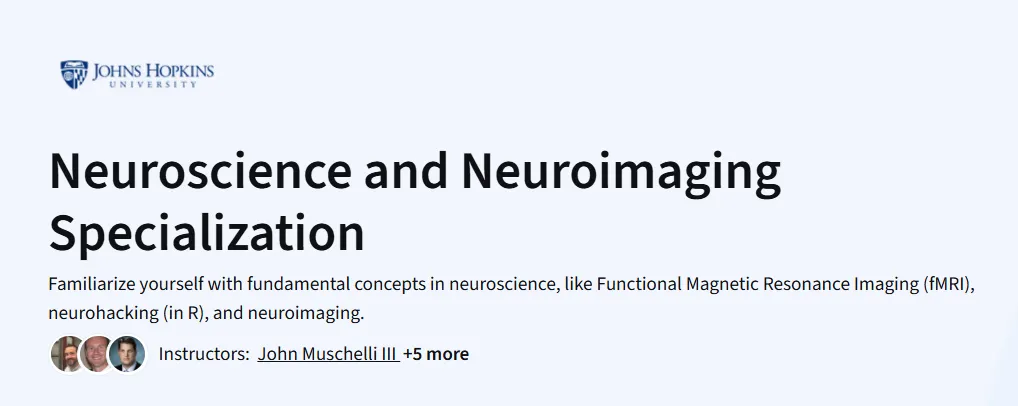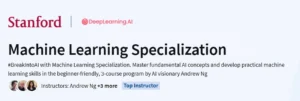What will you learn in Neuroscience and Neuroimaging Specialization Course
Learn how neurons communicate and encode information—delve into neural coding, signal variability, and what neurons represent.
Unpack neural decoding—see how to infer what the brain is perceiving or planning based on neural activity.
Get into the biophysical modeling of neurons with Hodgkin-Huxley and other computational models of dendrites and spiking behavior.
Build small neural networks: explore feedforward, recurrent, and network-level dynamics like synchronization and oscillations.
Program Overview
Course 1: Fundamental Neuroscience for Neuroimaging
⌛ (estimated ~4–6 hours)
Topics: Introduction to neuroanatomy. Basics of brain structure and function. Preparing for imaging techniques.
Hands-on: Watch videos and complete readings to understand the brain’s physical makeup and imaging needs.
Course 2: Principles of fMRI 1
⌛ (estimated ~6–8 hours)
Topics: How fMRI works. Experimental design in neuroimaging. Functional connectivity basics.
Hands-on: Learn how to set up and interpret fMRI experiments.
Course 3: Principles of fMRI 2
⌛ (estimated ~6–8 hours)
Topics: Deep dive into advanced fMRI analysis. Handling diffusion tensor and spectroscopy imaging. Modeling approaches.
Hands-on: Apply processing techniques to interpret complex imaging data.
Course 4: Introduction to Neurohacking in R
⌛ (estimated ~6–8 hours)
Topics: Using R for neuroimaging. Data manipulation, visualization, and analysis of structural MRI.
Hands-on: Build code in R to process and analyze MRI data sets.
Get certificate
Job Outlook
Suitable for learners aiming for research or tech roles at the intersection of neuroscience and computation—like brain-computer interfaces, neuroengineering, or theoretical neuroscience.
Builds strong foundational skills—like coding, mathematical modeling, and machine learning—that can transfer into data science or ML fields even outside academia.
Specification: Neuroscience and Neuroimaging Specialization
|
FAQs
- Prior neuroscience knowledge is not required.
- Basic coding experience in Python, MATLAB, or R is helpful but not mandatory.
- Designed for learners with interest in computational neuroscience.
- Starts with foundational concepts and gradually introduces coding.
- Suitable for science-minded beginners exploring neuro-computation.
- Neural communication, coding, and signal variability.
- Neural decoding and interpreting brain activity.
- Biophysical modeling of neurons using Hodgkin-Huxley and other models.
- Building small neural networks and exploring network-level dynamics.
- fMRI principles, neuroimaging data analysis, and R-based neurohacking.
- Coding assignments in MATLAB, Octave, Python, and R.
- Hands-on analysis of structural and functional MRI data.
- Exercises on neural network modeling and simulation.
- Practical projects integrate theory with computational tools.
- Builds portfolio-ready skills for neuro-computational research.
- Prepares for roles in neuroengineering, brain-computer interfaces, and research.
- Skills transferable to data science and machine learning fields.
- Strengthens coding, mathematical modeling, and analytical thinking.
- Suitable for academic, research, and tech industry opportunities.
- Provides foundation for advanced studies in computational neuroscience.
- Four courses, each 4–8 hours of content.
- Flexible, self-paced online learning.
- Combines lectures, readings, and hands-on coding exercises.
- Estimated total completion: ~24–30 hours.
- Allows learners to progress at their own speed while gaining applied skills.





